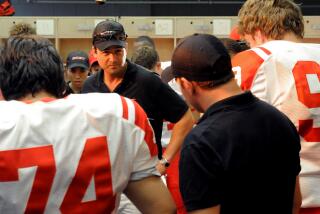If You Don’t Look to Pass, You’re Sure to Fail
The ball was floating, ever so gently, toward the half-court line. At first it seemed to be in slow motion, but it wasn’t.
This was adult basketball, where you don’t need to be Einstein to observe that all objects, especially humans, slow down. Way down.
Yet even at age 55, with no discernible vertical leap, this ball was mine. Basketball in hand, I headed for the hoop with only one defender, another parent at my daughters’ school, in my path. To my right, a teammate joined me. The fast break was on.
It was a situation I had been in thousands of times, but this classic two-on-one break was different from all others. That’s because filling the lane alongside me was Tom Rothman, the head of 20th Century Fox. And I was a writer. With a spec script in my gym bag.
The mechanics of the two-on-one break are simple: Head for the basket. If the defender moves to guard you, pass to your teammate for an easy layup. If he doesn’t guard you, the easy layup is yours. But nothing was easy here because the player in the other lane, with a simple nod of his head, could greenlight my first feature deal.
I had worked in television for years, and a bit of good fortune had allowed me to take some time off. At this point, I had no intention of returning to face the demands and politics of network TV. Feature films were the answer. And in an instant, I realized, this fast break might be my fast break into the world of motion pictures.
Although most of my game has all but disappeared, the ability to pass remains. With that in mind, my mission was clear: All I had to do was head for the basket and—at the last second—toss a perfect pass, let the studio chief hit the game-winner, share a high-five, tell him “great shot” (even though it’s a bucket Sherry Lansing could make in heels) and then sit and chat in the bleachers, allowing the message that “Wow, that Gilbert guy is a team player and easy to work with” subliminally sink into his sweaty corporate head. After that, it would to be a quick jump from “love to read that spec” to a three-picture deal.
By now, my new boss Tom and I were passing the top of the key. The defender, a non-pro in all senses of the word, was back on his heels, not sure what to do. And then it struck me: What if I passed to Tom and he missed?
Would a studio head say “my bad”—or was he going to blame me for a sloppy pass that caused him to miss a potentially game-winning layup, and maybe even mention my incompetence to other studio heads? It’s a small world, and these things get around.
Suddenly, we were crossing the foul line, aligned like senior synchronized swimmers. The guy on D was a split-second away from making his decision about whom to guard, oblivious that my entire future was in his hands.
About five feet from the basket, all analysis ended and instinct took over. The defender was on his heels, and there was nothing between me and the rim. It had been an interesting intellectual exercise, but now it was layup time—for me. Besides, I’d done fine in Hollywood without kissing anybody’s butt, so why should I start now?
Who was to say that this big, perspiring guy with thick glasses was going to help me anyway, even if I gave him the perfect pass? It was a ridiculous thought from the beginning. Decision made. I was going to take the shot myself, and if that meant no deal at Fox, I still had enough equity in my Hancock Park house to survive without those ungrateful suits.
And then, at the last instant, it happened.
The defender, still back on his heels, tripped on his new Nikes, sending him sprawling toward my feet. With no choice—but, more importantly, acting as if it were planned all along—I swiftly tossed the ball to Tom. He glided to the hoop and sank the uncontested layup. Game over.
Yes, I passed the ball to the studio bigwig. But not because of politics or to snag Writers Guild health coverage. I did it because it was the right play.
Really.
“Nice pass,” Tom said. And then I said “Nice shot,” just like in my script. But then he picked up his gym bag, said “Gotta go” and walked out. I never saw him again.
But I know he remembers me. He has to. It was a great pass
And if not, I’ll have to take the more traditional career route: I’ve heard about a game on the Westside with some pretty powerful agents.


